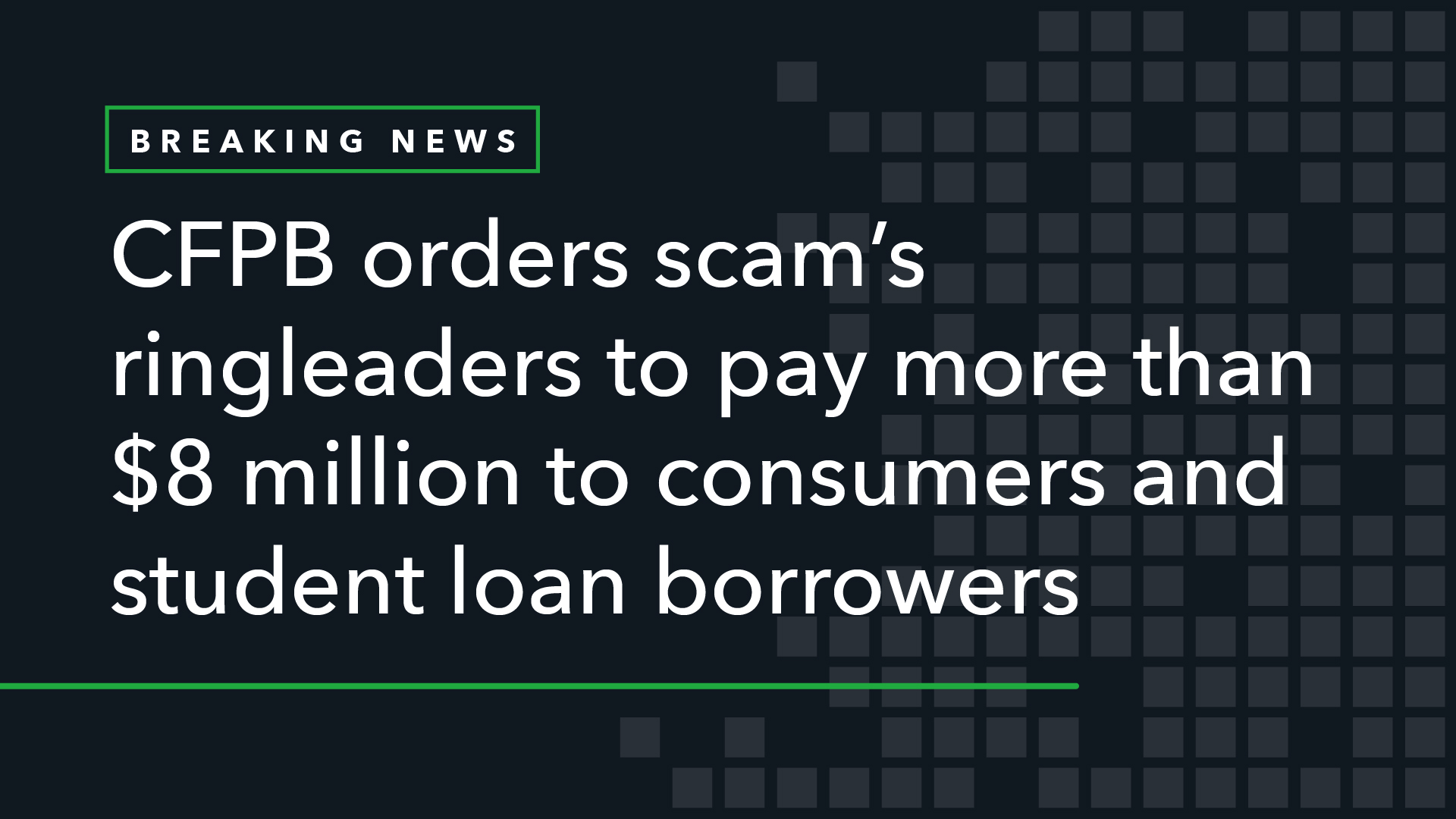Washington, D.C. – Today, the Consumer Financial Protection Bureau (CFPB) finalized an enforcement action against debt-relief payment-processors RAM Payment and Account Management Systems (AMS), as well as AMS’s co-founders, Gregory Winters and Stephen Chaya, for collecting debt-relief fees from consumers, lying to consumers about when the fees would be paid to debt-relief companies, and sending illegal advance fees to debt-relief companies before they were legally allowed to do so. They also failed to return funds to consumers who cancelled student-loan debt relief agreements, as required by law. The CFPB is ordering RAM Payment, AMS, Winters, and Chaya to pay more than $11 million in consumer redress and civil money penalties.
“Too often, bad actors take advantage of student loan borrowers and others who are seeking to get out of debt,” said CFPB Director Rohit Chopra. “Our law enforcement action bans the facilitators and their ringleaders for their illegal acts.”
Based in Knoxville, Tennessee, AMS and RAM Payment provided account maintenance and payment-processing services to about 270,000 consumers across the U.S. who were enrolled in debt relief programs. Winters and Chaya co-founded AMS. RAM Payment acquired AMS in 2019. After the acquisition, Winters and Chaya continued to manage AMS and RAM Payment, and they exercised substantial control over the companies’ business practices.
Providers of account-maintenance and payment-processing services to debt-relief companies are supposed to be independent, third-party companies that hold fees until debt-relief companies are entitled to them under the law.
The CFPB’s investigation found that the respondents violated the Telemarketing Sales Rule and the Consumer Financial Protection Act. The respondents substantially assisted student-loan and traditional debt-relief companies in requesting or accepting advance fees for debt-relief services, misrepresented their payment-processing actions to consumers before disbursing fees to student-loan debt-relief companies, and unfairly disbursed unearned fees for student-loan debt-relief services after consumers had unenrolled from or canceled the services. Specifically, the respondents harmed consumers by:
- Unlawfully collecting, processing, and disbursing fees: The respondents collected fees from consumers and provided those fees to student-loan debt-relief companies before the consumers’ debts had been renegotiated or a payment was made pursuant to a new debt settlement, as required by law. The respondents also disbursed illegal upfront debt-relief fees that were ostensibly for add-on services marketed by debt-relief companies as legal plan memberships. Some debt-relief companies and legal plan providers claimed these legal plan memberships provided consumers with access to lawyers to assist with debt settlement, were included in the cost of debt-relief services, or were essential to effectively settle consumers’ debts.
- Deceiving consumers about the fees they paid: The respondents led consumers to believe that AMS and RAM Payment would not disburse fees until student-loan debt-relief companies had earned the fees, but they failed to confirm that fees had been earned before paying them to debt relief companies.
- Paying companies for referrals: The respondents paid illegal commissions to third-party marketing companies connected with student debt-relief companies and traditional debt-relief companies, for a stream of customer referrals, also in violation of rules designed to ensure that account maintenance services are independent.
Additionally, Winters and Chaya sought to enrich themselves through illegal relationships with an affiliated financing company and debt-relief companies. Winters and Chaya owned a financing company, Account Connect Limited (ACL). For certain debt-relief companies, ACL advanced about 65% of the fees that the companies expected to receive from consumers. ACL recouped these advances from payments consumers made into accounts maintained by AMS and RAM Payment. The respondents deceived consumers by failing to disclose this conflict-of-interest between the respondents and ACL. Instead, the respondents falsely represented that AMS and RAM Payment provided services as independent third-party companies. They also illegally kept money held in consumers’ accounts when consumers cancelled or unenrolled from ACL-funded student-loan debt-relief services with companies.
Enforcement Action
Under the Dodd-Frank Wall Street Reform and Consumer Protection Act, the CFPB has the authority to take action against institutions violating consumer financial laws, including the Telemarketing Sales Rule, which targets deceptive and abusive telemarketing practices, and engaging in unfair, deceptive, or abusive acts or practices. The CFPB’s order:
- Requires the respondents to refund $8.7 million to consumers enrolled in student-loan debt-relief services: The redress amount reflects the amount of unrefunded fees charged by AMS or RAM and, for consumers enrolled in student-loan debt-relief services financed by ACL, any unrefunded consumer fee payments for student-loan debt-relief services that AMS or RAM Payment disbursed to ACL.
- Issues industry bans against the respondents: AMS, Winters, and Chaya are banned from the debt-relief payment-processing and account maintenance industry. RAM Payment must stop providing services to both student-loan debt-relief companies and debt-relief companies receiving funding from or owned by an affiliated company, stop paying commissions to third-party marketing companies for consumer referrals, and consent to the CFPB’s supervisory authority.
- Requires the respondents to pay a $3 million fine: Respondents will pay a $3 million penalty to the CFPB, which will be deposited into the Bureau’s victims relief fund.
The Consumer Financial Protection Bureau is a 21st century agency that implements and enforces Federal consumer financial law and ensures that markets for consumer financial products are fair, transparent, and competitive. For more information, visit consumerfinance.gov.
Official news published at https://www.consumerfinance.gov/about-us/newsroom/cfpb-orders-scams-ringleaders-to-pay-more-than-8-million-to-consumers-and-student-loan-borrowers/
Images courtesy of PixaBay
The post CFPB Orders Scam’s Ringleaders to Pay More Than $8 Million to Consumers and Student Loan Borrowers first appeared on RSVTV news.
originally published at Finance - RSVTV news

